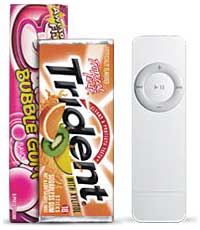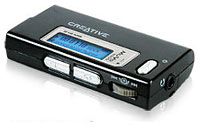Macworld
San Francisco brought us two things that the Apple Rumor Mill had
been churning out repeatedly for the past several years - the
"headless iMac" and the "flash iPod". With backorders and server
slowdowns abundant within hours of the announcement of these
products, the popularity of these two items is obvious.
While the Mac mini is a hot
item up for much discussion, there's no doubt that the iPod shuffle will be
one of the most debated moves Apple has made in recent history.
Apple has been known to remove "key" items, such as floppy
drives, from its product line with much controversy and success.
Will the iPod mini follow in the footsteps of the iMac? Let's see
why and why not.
The Price
First and foremost, the iPod shuffle is expensive. If computed
using last week's value equation, we see
the shuffle costs US$150-200 a gigabyte. Relative to even the
iPod mini, this
price is outrageous! Given the feature set, you're paying quite a
premium.
Compared to other iPod, you don't get equalizer features or even
the game and organizer functions. Most importantly, it has no
screen.
But let's talk about how his price is justified. The Apple brand
has often been compared to BMW. Using this model, some things make
a little more sense. Few people have a BMW, but those who do love
it.
Either way, they pay a premium to own such an object. If one can
say that you pay a premium for a regular iPod over other digital
music players, then what about the shuffle?
 The Style
The Style
If we've learned anything about both BMW and Apple owners, we
know they're willing to pay a premium for three things that both
companies are known for: quality, brand name recognition, and
style
Looking at style gives us reason for the premium price for the
iPod shuffle. It's small; people like that. They like the fact that
this thing can be worn around their neck. Even owning "that MP3
player without a screen" has some bearing for the fashion
conscious.
There are a few downsides to the style, though. Something the
size of a pack of gum but costing more than thirty times as much
shouldn't be as loseable as it is. While the included lanyard does
make it a bit harder to lose, the shuffle can still be easily
misplaced.
Owning an iPod mini myself, I cannot say I've never misplaced
it. And how many of us have lost packs of gum? Of course this gum
analogy is highly fallible, but it goes to show how easily it is to
lose this US$100-150 object.
Comparing Apples to Apples
People can't keep comparing the shuffle to the regular iPod.
It's just not the same. At risk of sounding lame, you cannot
compare Apples to Apples here. The iPod shuffle is aimed at a
"sport" type of market; it's meant to be used in different
applications than a regular iPod. It's more conducive to use while
running or biking. It uses solid-state memory, and it's very
compact.
 So let's compare the shuffle to a more
comparable competitor, the Creative
Muvo Micro. Priced closely to the iPod shuffle
it adds quite a bit more. It has an FM radio, built-in microphone,
and most importantly, an LCD screen. Battery life is also a tad
better, but nothing to brag about (12 hours for the shuffle, 15 for
the Muvo).
So let's compare the shuffle to a more
comparable competitor, the Creative
Muvo Micro. Priced closely to the iPod shuffle
it adds quite a bit more. It has an FM radio, built-in microphone,
and most importantly, an LCD screen. Battery life is also a tad
better, but nothing to brag about (12 hours for the shuffle, 15 for
the Muvo).
Stylewise, the shuffle comes ahead. Even though the Muvo Micro
comes in several cool colors, the simplicity of the shuffle just
plain out beats Creative's offering. While the Muvo Micro is small,
the shuffle is smaller, weighing .02 ounces less than the Micro -
before it even has a battery installed.
The shuffle does have some neat features, such as its ability to
be used as a flash drive (or even a makeshift
RAID array). Of course, this is not enough to
justify the sacrifice you must make to get the shuffle.
The bottom line is that you're sacrificing quite a lot for
Apple's style, quality, and name. Both of these devices are
aesthetically pleasing, and while no one can really measure
aesthetics and features based on equal pricing, it's not worth it
for the shuffle when compared like so.
Let's Talk About the Screen
We've seen Apple do this before with the iMac when they sold it
sans floppy drive. People went crazy for a while, but overall it
was a huge success. Most computers today, Mac or PC are sold
without a floppy drive.
But his comparison isn't too accurate. While at first there was
no real way to use removable, recordable media with the iMac,
Iomega, Imation, and others quickly came out with Zip, SuperDisk,
and floppy drives to get around this problem. Later iMacs had
removable, recordable media in the form of CD-RW.
Are we going to see after-market screens for the iPod shuffle? I
doubt it.
Is it Worth It?
In the end, I doubt that all future iPods will go the way of the
shuffle. It's selling like hot cakes now, and it will for a while
because anything Apple makes like this will always have its niche.
As far as people who want an iPod, they might as well save up the
extra hundred dollars and buy the iPod mini.
For someone who really needs a small MP3 player, something along
the lines of the Muvo is the better buy.
All in all, this product is not worth it. 

 The Style
The Style So let's compare the shuffle to a more
comparable competitor, the
So let's compare the shuffle to a more
comparable competitor, the 
